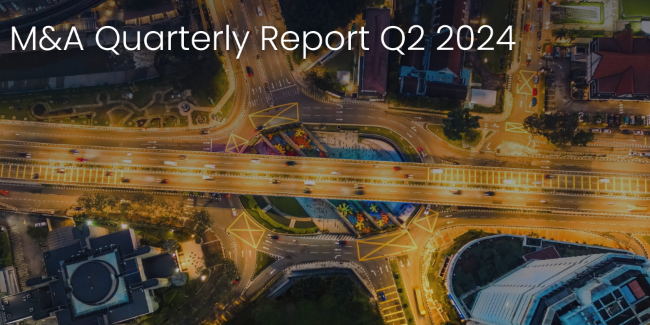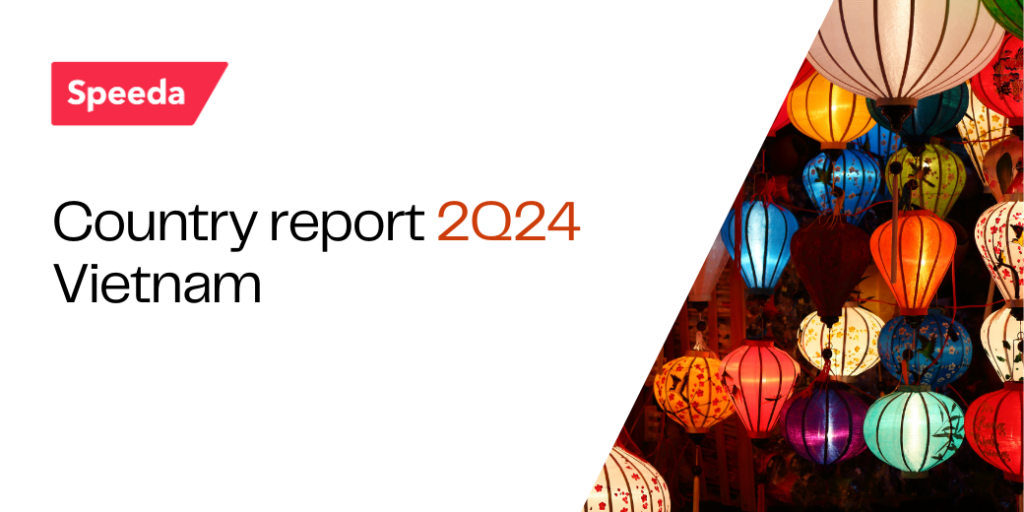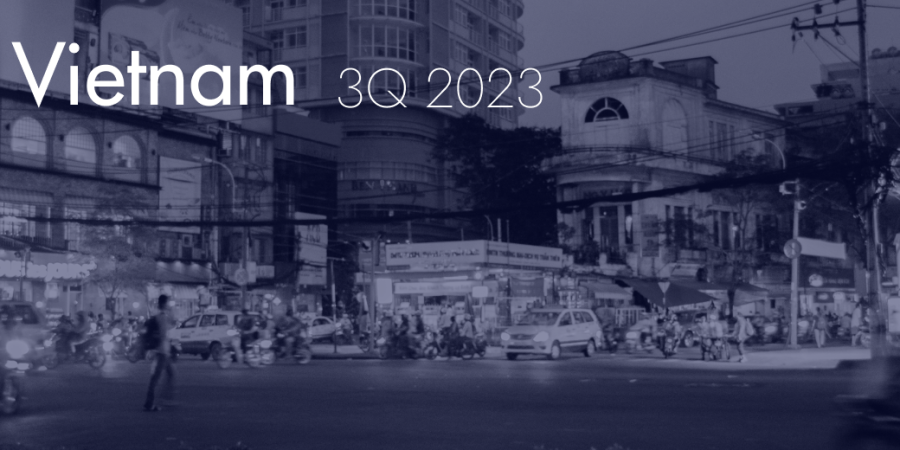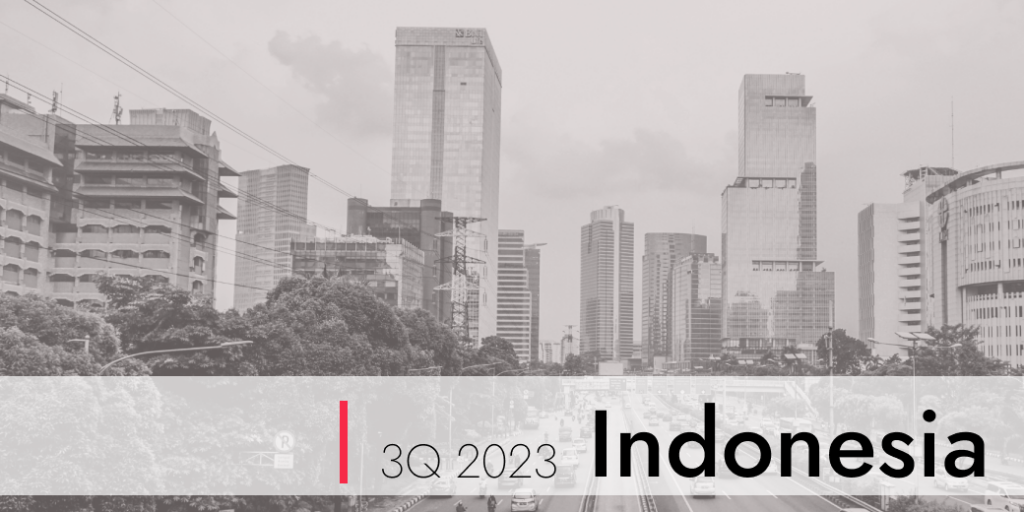Báo cáo Xu hướng
2024 2Q M&A Quarterly Report

Get the Full Report
For detailed insights, register at the end of this article to download the full report.
As Vietnam moves through 2024, the country showcases both impressive strides and areas needing improvement. On the positive side, Vietnam’s economy has rebounded strongly, with sectors like manufacturing and agriculture driving growth, and government policies—such as VAT reductions and tax incentives—creating an investment-friendly environment. The rise of digital and e-commerce initiatives, combined with technological collaborations in AI and cloud computing, positions Vietnam as a forward-thinking player in the global market.
However, challenges persist. Political transitions, though aimed at reform, have sparked concerns over stability and bureaucratic efficiency, potentially unsettling investor confidence. Inflationary pressures, exacerbated by a weakening Vietnamese Dong, are tightening margins for businesses, particularly those reliant on imports. Additionally, while strides are being made in sustainability, Vietnam’s ESG efforts remain underdeveloped, with local companies slow to adopt necessary measures due to a lack of clear regulations.
Vietnam’s Political Shift and Legal Measures in 2024: Navigating Change and Opportunity
New Leadership and Anti-Corruption Drive Bring Both Hope and Uncertainty
In Q2 2024, Vietnam underwent a significant political transition with the election of To Lam as the new president, a development that has generated both optimism and uncertainty. This leadership change follows a wide-reaching anti-corruption campaign spearheaded by Party General Nguyen Phu Trong, which led to the resignation of the previous president. While the campaign is aimed at enhancing governance and rooting out corruption, it has also introduced challenges. Political infighting and bureaucratic slowdowns, particularly in areas such as procurement approvals and public fund disbursements, have raised concerns among businesses and foreign investors who have traditionally valued Vietnam’s political stability.
The new leadership has committed to further transparency and political reform, with the hope of stabilizing the political environment and boosting investor confidence. However, the pace of these reforms and the ability to maintain political stability in the midst of rapid change will be crucial factors for businesses considering investments or expansions in Vietnam. Despite these uncertainties, the government’s dedication to long-term economic growth remains clear, with continued efforts to provide a framework conducive to both domestic and foreign enterprises.
Tax Incentives and Investment-Friendly Policies Driving Economic Growth
Alongside these political shifts, Vietnam’s legal landscape in Q2 2024 also saw several key developments aimed at bolstering economic growth. The temporary reduction of Value-Added Tax (VAT) from 10% to 8%, effective from July to the end of the year, is one of the most notable measures. This tax reduction is intended to stimulate domestic consumption by lowering costs for consumers and promoting spending in prioritised sectors. Additionally, a range of tax incentives has been introduced to attract investments in technology, healthcare, and sustainable industries. Projects in high-tech fields, as well as those located in disadvantaged regions, benefit from reduced corporate income tax rates and exemptions, positioning Vietnam as an appealing destination for foreign direct investment.
The government’s focus on promoting green industries through tax breaks and subsidies for environmentally friendly projects further underscores its commitment to sustainable growth. These legal measures, combined with the ongoing political reforms, highlight Vietnam’s dual approach of fostering both economic stability and long-term sustainability amid a rapidly evolving landscape.
Vietnam’s Economic Resilience Amid Rising Inflation and Shifting Demographics
Economy Bounces Back with Strong Growth, But Inflationary Pressures Loom
In the second quarter of 2024, Vietnam’s economy demonstrated remarkable resilience, continuing its strong recovery. Key sectors such as manufacturing and agriculture were major contributors to this growth, with manufacturing benefiting from robust exports of electronics and components. Agriculture also experienced substantial expansion, playing a pivotal role in the country’s economic rebound. The overall business environment remained favorable, supported by government policies designed to stimulate investment and maintain economic stability.
However, despite this economic strength, inflationary pressures have emerged as a key concern. The cost of living has risen, particularly in areas such as healthcare, education, and housing, while a weakening Vietnamese Dong has added to these challenges, raising the cost of imports and tightening margins for businesses. To navigate these pressures, the State Bank of Vietnam has maintained a cautious approach, holding interest rates steady to provide stability in the face of rising inflation.
Vietnam’s Shifting Demographics: An Aging Population and the Rise of the “Solo Economy”
In parallel with these economic developments, Vietnam’s demographic landscape is undergoing significant transformation. The population is gradually aging, with a growing number of individuals aged 65 and older, which is set to strain the healthcare system and social welfare programs. At the same time, Vietnam’s younger workforce remains a key asset, though there are shortages in high-demand fields like technology, creating opportunities for targeted upskilling and reskilling initiatives.
A notable social trend is the rise of the “solo economy,” characterized by the increasing number of single-person households. This shift is reshaping consumer preferences, driving demand for single-use, small-sized products, and premium goods. Businesses that cater to these evolving needs with tailored offerings and loyalty programs are well-positioned to thrive. Furthermore, the digital habits of Vietnam’s younger generation are having a profound impact on the consumer landscape. Short-form video content, business messaging, and artificial intelligence are all playing growing roles in shaping purchasing behavior. As Gen Z continues to enter the workforce, their technological expertise is expected to accelerate the adoption of AI-driven tools, empowering companies to deliver more personalized customer experiences and enhance operational efficiency.
Technological Shift with Regulatory Tightening and Cross-Border E-Commerce Expansion
Vietnam’s technological landscape is undergoing significant transformation, driven by both regulatory changes and new initiatives to support local brands on a global scale. In Q2 2024, the Vietnamese government is finalising the Draft Decree on Cybersecurity Administrative Sanctions. This draft reflects the government’s focus on tightening cybersecurity regulations, ensuring data protection, and penalising breaches more rigorously. Companies operating in Vietnam must now enhance their cybersecurity measures to comply with these stricter guidelines or risk facing penalties.
Alongside regulatory developments, Vietnam is capitalising on its burgeoning digital economy. The launch of the second phase of the ‘Cross-border E-commerce: The Breakthrough Era’ program aims to elevate ‘Made-in-Vietnam’ products on the global stage. In collaboration with Amazon Global Selling, this initiative is designed to bolster the export capabilities of Vietnamese businesses, particularly in export-oriented industries. By providing educational resources and support for industry associations, this program is set to empower Vietnamese brands to compete more effectively in international markets.
Additionally, Vietnam is embracing emerging technologies in various industries. For example, Portcoast’s partnership with Autodesk to apply Building Information Modelling (BIM) in infrastructure projects is set to revolutionise the construction sector by optimising designs and reducing operational risks. In the automotive space, Vinfast’s collaboration with Analog Devices (ADI) aims to improve battery management systems for electric vehicles, enhancing efficiency and performance.
The integration of AI and cloud technologies is also gaining momentum, with local firms like FPT partnering with NVIDIA to boost AI capabilities in Vietnam. This collaboration focuses on implementing NVIDIA’s GPU technologies to support high-performance computing, positioning Vietnam as a key player in the AI and cloud computing sectors.
ESG Initiatives Remain Nascent Though Plans are in Place with Carbon Market Prospects
Vietnam’s environmental landscape is still in the early stages of implementing robust sustainability practices. As of Q2 2024, reporting on Environmental, Social, and Governance (ESG) performance remains limited, with only 20 publicly listed companies participating in the Vietnam Sustainability Index (VNSI). The lack of standardised ESG metrics and accessible public data presents significant challenges for businesses aiming to meet international sustainability standards. This has created a divide between foreign-invested enterprises (FIEs), which have made more significant strides in ESG commitments, and local public companies, which often take a “wait-and-see” approach.
However, Vietnam is taking steps toward addressing these challenges. Plans are underway to establish a domestic carbon market by 2027, which will create a formal mechanism for trading carbon credits and incentivizing companies to reduce their carbon emissions. This initiative, driven by Decree No. 06/2022/ND-CP, sets the stage for a structured framework for managing carbon credits and conducting emissions trading, with a carbon credit trading platform expected to be operational by 2025.
Foreign-invested enterprises are currently leading the ESG efforts, following strategies set by their overseas parent companies. However, the broader adoption of sustainable practices among local businesses is hindered by a lack of regulatory clarity and awareness around the importance of ESG reporting.
Unlock Vietnam’s Q2 2024 Insights: Stay Ahead with Speeda as Your Go-To Research and Insights Platform
Discover Vietnam’s rapid growth and evolving challenges in less than 10 minutes with Speeda. Our platform delivers concise, comprehensive insights across political, economic, social, technological, environmental, and legal sectors, allowing you to uncover the full picture of the country quickly and effectively. With Speeda, you’ll stay informed and ready to make data-driven decisions that can drive your business forward.
This summary offers a brief overview of Vietnam’s key developments in Q2 2024. For a detailed report covering all aspects, register below to receive the full report.
Additionally, the Speeda team is available for a free consultation to help you unlock fast, reliable insights tailored to your needs.
Schedule a consultation with our experts here and discover how Speeda can empower your strategic planning. Apply for a Online Demo with our team!
Thank you for your submission!
We will send an email with the download link to access the report shortly.
Theo dõi trang LinkedIn của chúng tôi!
Chúng tôi sẽ đăng các báo cáo mới nhất về
ASEAN và thông tin về các hội thảo trực tuyến tại đây.









